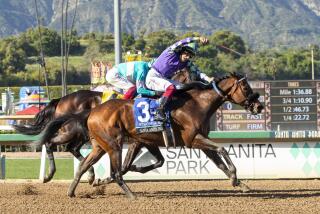Manley Taking the Reins
- Share via
The size of the athletes Dwight Manley represents is about to shrink.
The problems they face, however, are huge.
Once the agent for former NBA All-Star Karl Malone, Manley is preparing to represent a lot of 5-foot-4, 115-pound jockeys as head of the troubled Jockeys’ Guild. Manley and the Rev. Jesse Jackson have formed a surprising alliance and plan to help athletes whose benefits and pay Manley said were “stuck in the past.”
“It’s health and security,” Manley said, citing ongoing concerns about insurance in the wake of a scandal in which riders’ policies were allowed to lapse.
“The athletes in the most dangerous sport in America have the worst protection in America,” Manley said. “They don’t have a pension. They have to ride longer than they should, some of them. And they’re forced to ride at a very unhealthy weight.”
A Newport Beach businessman with few ties to horse racing, Manley was elected to the position of national manager this week by the nine jockeys on the guild’s board of directors, seven months after former president L. Wayne Gertmenian was fired amid the insurance scandal and allegations of financial improprieties.
Jackson, who addressed the jockeys Monday, would play a leadership role that would include such responsibilities as lobbying government officials, said Manley, who has worked with the civil rights activist on other causes, including hurricane relief. Jackson’s title will be senior advisor, said jockey Alex Solis, a member of the board.
Though the Jockeys’ Guild has not yet announced the appointments, it referred questions Thursday to Manley, who said he was completing the details of a contract under which he would lend the financially troubled organization at least $500,000 and work without a salary, instead agreeing to a share of potential profits.
“I’m putting my money where my mouth is,” said Manley, who made a fortune dealing in rare coins before becoming a sports agent and recently has invested heavily in Orange County real estate.
“Knock on wood, I haven’t been unsuccessful on any projects I’ve been involved in,” he said.
With Jackson’s involvement grabbing headlines and Manley having little racing background, some industry insiders question the decision to choose the pair to lead the Jockeys’ Guild over former jockey and industry consultant David Stevenson -- especially after Gertmenian, another outsider, promised change before a tenure that ended in disaster.
Solis contended that Manley’s experience outside of racing is an advantage. “His background is very impressive. I don’t think it will take him 100 years to learn. Jesse Jackson, say what you want, he is controversial, but the Jockeys’ Guild has never had someone signed on to help us of this magnitude.”
Manley said someone with knowledge of other sports would be an asset. Though he has spent time at Santa Anita, Del Mar and Hollywood Park, he said he knew little about the business before being urged to look at the jockeys’ situation by Michael Bello, a friend and horse owner from Orange County who raced Megahertz, a multiple stakes winner.
At the Belmont Stakes on June 10, Manley talked to riders and said he came away “engrossed” by their situation, particularly in contrast to other professional athletes.
The winning jockey in a race gets 10% of the purse, but owes his agent a percentage, sometimes as much as 25%.
A rider who finishes out of the money earns only a small mount fee, usually less than $100.
“If you ride in the Kentucky Derby and you don’t win, place or show, you get $75, which is incredibly out of scale when people are playing tens of thousands to be there and the value of the winning horse could be $50 to $70 million,” Manley said.
Manley compared their compensation to “pre-union, pre-television” eras in other sports.
John Velazquez, the leading rider in the nation the last two years and chairman of the Jockeys’ Guild board, earned purses totaling about $24.5 million last year, and Manley said Velazquez got $2.1 million of that, before agent fees and expenses.
“The No. 1 jockey in America is making less than, say, the 100th best golfer,” Manley said.
The 100th player on the PGA Tour money list earned slightly less than $850,000 last year, but 28 golfers earned at least $2.1 million.
For less accomplished riders than Velazquez and other elite jockeys, the numbers can be bleak.
“You can’t have guys risking their lives to make $15,000 or $20,000 a year with no benefits, no security,” Manley said.
The plan, he said, is not necessarily to try to extract larger percentages from purses for jockeys but to promote the struggling industry and market the jockeys, most of whom have low profiles, especially after a recent wave of retirements.
“It’s the overall system. A rising tide lifts all ships,” he said.
Poised to gain some 1,300 new clients, Manley said that although he still handled some business for the retired Malone, he no longer represented basketball players or other athletes.
“I had done it, and I did it well. It wasn’t challenging any more,” he said.
Once, Manley dealt with the antics of former client Dennis Rodman.
Now, he’s trying to learn a new industry.
“I’m up to my eyeballs in data,” Manley said.
Some friends don’t know why.
“Even at the last minute, I was counseled not to do it,” he said. “But when you see the faces of the jockeys, they’re sincere people, so hard-working ...
“It’s a big, complex situation because, fundamentally, what has to be done is bring them into the 21st century like all of the other sports.”
More to Read
Go beyond the scoreboard
Get the latest on L.A.'s teams in the daily Sports Report newsletter.
You may occasionally receive promotional content from the Los Angeles Times.










